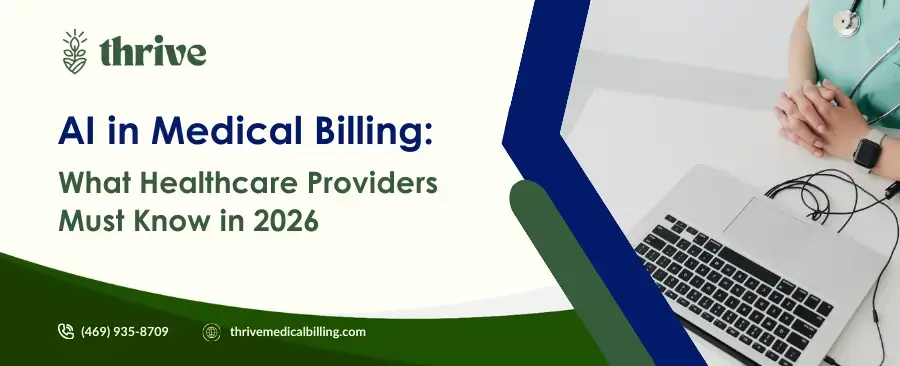Medical billing is a key part of the U.S. healthcare system. It ensures that healthcare providers receive payment for their services. It also keeps financial information clear for patients and insurance companies.
At Thrive Medical Billing, we know how important medical billing is. It helps make operations smoother, improves cash flow, and enhances patient care. This blog post looks at the purpose, process, and impact of medical billing in healthcare. It highlights why medical billing is important for healthcare organizations, providers, and patients.
What is Medical Billing?
Medical billing is the process of sending and tracking claims to insurance companies. This helps healthcare providers receive payment for the services they offer.
It involves turning patient data, medical history, diagnoses, and procedures into standard codes. These codes include CPT (Current Procedural Terminology) and ICD-10 (International Classification of Diseases). This process helps create accurate claims.
Someone submits these claims to payers, facilitating timely payments for healthcare providers. Additionally, it guarantees that patients accurately receive bills for any expenses they need to cover themselves.
Medical billing encompasses multiple stages, from patient registration to payment posting and denial management. It connects patients, healthcare providers, and insurance companies. This link keeps healthcare organizations financially healthy and supports good patient care.
The Medical Billing Process: A Step-by-Step Overview
The medical billing process is complex. It needs accuracy and skill to prevent mistakes. Errors can cause claim denials or delays. Here’s a breakdown of the key steps:
- Patient Registration: The process begins when a patient schedules an appointment or checks in at a healthcare facility. We collect demographic and insurance information to verify coverage and eligibility.
- Insurance Verification: Medical billers check the patient’s insurance details. They ensure the patient’s plan covers the services provided. This step prevents claim rejections because of outdated or incorrect insurance information.
- Medical Coding: After a patient visit, medical coders change the healthcare provider’s notes into standard codes. These include procedure codes (CPT, HCPCS Level II) and diagnosis codes (ICD-10-CM). This creates a “superbill” that details the services rendered.
- Charge Entry: Staff enter charges for medical services into a practice management system. This includes any payments collected at the time of service. Accurate charge capture accounts for all services.
- Claim Submission: Providers use the superbill to prepare and send claims to insurance companies. You can do this directly or through a clearinghouse. Claims must comply with payer policies and regulations, such as HIPAA, to avoid rejection.
- Claim Adjudication: The insurance company reviews the claim to determine its validity and the reimbursement amount. Approved claims result in payments to the provider, while denied claims require further action.
- Payment Posting: After receiving payment, medical billers allocate it to the patient's account and confirm it with the claim. The billing department then invoices the patient for any remaining balances.
- Denial Management: When a claim is denied, billers examine the reasons for the denial. They fix any errors and then resubmit or appeal the claim. Effective denial management minimizes revenue loss.
- Patient Billing and Collections: Patients receive statements for any remaining balances, such as copays or deductibles. Medical billers follow up on unpaid balances to ensure timely collections.
- Reporting: We create detailed reports to track important metrics, such as claim approval rates and revenue cycle efficiency. This helps healthcare organizations improve their financial operations.
Why Medical Billing Matters in the U.S. Healthcare System
Medical billing plays a pivotal role in the healthcare industry, impacting financial stability, compliance, and patient satisfaction. Here are some key reasons why it’s essential:
1. Ensures Financial Stability for Healthcare Providers
Accurate and efficient medical billing affects a healthcare organization’s cash flow and financial health. By submitting claims promptly and minimizing claim denials, medical billers ensure providers receive timely reimbursements for medical services. This financial stability allows healthcare organizations to invest in advanced technology, staff training, and quality patient care.
2. Enhances Patient Experience
Transparent and accurate billing practices contribute to a better patient experience. When providers process claims correctly, patients avoid unexpected costs and gain clarity on their financial responsibilities. Clear communication during patient registration and billing fosters trust between patients, healthcare providers, and insurance companies.
3. Supports Compliance with Regulations
Medical billing ensures compliance with federal regulations, such as the Health Insurance Portability and Accountability Act (HIPAA), and payer-specific guidelines. Proper documentation and coding prevent fraud and errors, protecting healthcare organizations from legal and financial penalties.
4. Streamlines Revenue Cycle Management
Medical billing is an important part of revenue cycle management (RCM). RCM includes all financial steps from patient registration to final payment. Efficient billing practices reduce administrative burdens, allowing healthcare providers to focus on patient care rather than paperwork.
5. Reduces Claim Denials and Rejections
Claim denials and rejections can disrupt cash flow and increase administrative workload. Skilled medical billers use advanced software and careful claim checks to find errors before submission. This helps reduce denied claims and ensures faster payments.
Challenges in Medical Billing and How to Overcome Them
Despite its importance, medical billing faces several challenges that can impact efficiency and revenue. Common issues include:
- Coding Errors: Incorrect or incomplete procedure codes can lead to claim rejections. Regular staff training and advanced coding software can mitigate these errors.
- Claim Denials: Denials often result from missing information or non-compliance with payer policies. Implementing standard operating procedures and regular audits can address recurring denial patterns.
- Regulatory Changes: The healthcare industry is subject to evolving regulations, requiring billers to stay updated. Partnering with a professional billing service like Thrive Medical Billing ensures compliance with the latest guidelines.
- Data Security: Protecting patient data is critical. End-to-end encryption and compliance with HIPAA standards safeguard sensitive information.
At Thrive Medical Billing, we solve these challenges by using advanced technology. We also provide ongoing staff training and build strong partnerships with clearinghouses. This helps us make claim submission and denial management easier.
The Future of Medical Billing: Technology and Patient-Centric Care
The medical billing landscape is evolving with advancements in technology and a shift toward value-based care. Artificial intelligence (AI) and electronic health records (EHRs) are changing billing.
They automate tasks like coding and claim processing. This reduces errors and improves efficiency. These innovations enable faster reimbursements and better integration with practice management systems.
Additionally, the focus on patient-centric care is driving more transparent billing practices. Patients now expect clear cost estimates, user-friendly payment portals, and open communication about their bills. By prioritizing these elements, healthcare organizations can enhance patient satisfaction and trust.
How Thrive Medical Billing Can Help
At Thrive Medical Billing, we focus on making the medical billing process better. This helps improve cash flow, lower administrative work, and enhance patient care. Our services include:
- Expert Coding and Billing: Our certified professionals ensure accurate coding and claim submission to minimize denials.
- Denial Management: We analyze and resolve denied claims quickly to maximize reimbursements.
- Compliance and Security: We adhere to HIPAA and payer regulations, protecting patient data with robust security measures.
- Revenue Cycle Management: Our comprehensive RCM solutions streamline financial operations, allowing providers to focus on patient care.
When you outsource your medical billing to Thrive Medical Billing, you get expert help. You also benefit from advanced technology and customized solutions. These can improve your financial success and make your operations more efficient.
Conclusion
One cannot overstate the role of medical billing in the U.S. healthcare system. It ensures financial stability and helps with compliance. It also improves the patient experience. It does this by connecting healthcare providers, patients, and insurance companies.
At Thrive Medical Billing, we focus on providing accurate and efficient billing services. Our goal is to help healthcare organizations succeed.







